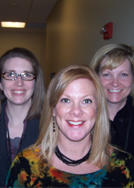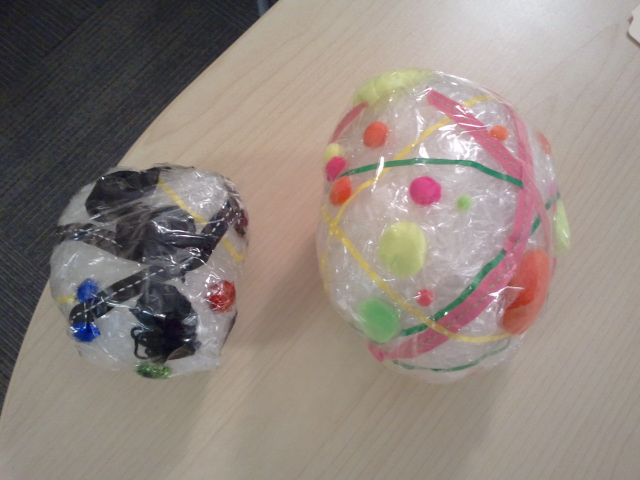The Harvard Family Research Project separated from the Harvard Graduate School of Education to become the Global Family Research Project as of January 1, 2017. It is no longer affiliated with Harvard University.

|
April 18, 2013 Helping Parents Become Interventionists Through the Use of Child Assessment DataHeather Schrotberger, Andrea Clements, Elizabeth Nichols
|
Related Resources
Making Data Come Alive for Families through Young Children’s Play
This article discusses the use of young children's work as a unique type of data to track development and share children's progress with parents.
Taking Leadership, Innovating Change: Profiles in Family, School, and Community Engagement
This resource is a compilation of twelve program snapshots of leading innovations in family engagement as an integral and effective strategy in systemic education reform. Project EAGLE is featured in a program snapshot.
Voices From the Field
Project EAGLE’s Heather Schrotberger, director; Andrea Clements, home-based manager; and Elizabeth Nichols, center director, discuss how EAGLE shares data with families. Project EAGLE is a major division of the Department of Pediatrics within the School of Medicine at the University of Kansas Medical Center. Project EAGLE serves families through home-based and center-based early childhood education and comprehensive family support programs: Educare of Kansas City, Early Head Start, Connections, Healthy Start, Healthy Families, and Early Steps to School Success.1
At Project EAGLE, all of our work with parents is guided by our desire to show them the importance of their role in their young child’s development and to empower them to support their child’s education. Given that we work with young children who are most at risk for academic failure, we want to help parents become effective interventionists in their child’s life and to let them know that what they do early on (prenatally to age 3) really matters for their child’s long-term cognitive and physical growth. When parents think about themselves as interventionists, they feel confident exerting an influence in their child’s life and feel that they are able to implement strategies to help them to improve their child’s behavior, cognition, or emotional state.
We provide families with a number of enjoyable, visually compelling activities to help parents become interventionists (see Figure 1), and we use child assessment data to anchor all of our conversations with families about how their child is growing and learning.

Figure 1. To start the discussion about families’ roles in children’s brain development, EAGLE’s home visiting staff have families use Bubble Wrap and craft materials to create models of healthy brains (pictured on the right with vibrantly colored pom-poms and ribbons representing connections in the brain) and unhealthy brains (pictured on the left with black paper and pom-poms that represent voids). After parents have completed the project, home visitors ask questions such as, “What types of things would you like to focus on during the next month to make colorful connections in your child’s brain?” Home visitors reference these two models in future sessions as well. As they observe parent–child interactions, for example, they ask, “As you are doing this with your child, which brain do you think you’re fostering?”
DATA SHARING–AN IMPORTANT PART OF WHAT WE DO
From their first days with us, parents know that ongoing assessment and data sharing are an important part of what we do to help young children grow and thrive. New families walk away from their first conversations with our staff knowing that we believe in data-driven practices and that we are intentional about all of the data that we collect—we collect and review all data for the purpose of following the child’s and family’s progress over time. In our center-based programs, we use the results of child assessments, such as the Preschool Language Scale (PLS), which looks at language development; the Devereaux Early Childhood Assessment (DECA), which looks at social-emotional skills in infants and toddlers; and the Peabody Picture Vocabulary Test (PPVT), which assesses children’s vocabulary, to help guide the work that parents and teachers do at home and in the classroom. Parents know that data collection is routine and that we carry out assessments on a regular basis. Just as it becomes a routine part of the role of our staff to collect and share data, families participating in our programs know that they will be receiving data on a regular basis in order to help them understand how their child is growing.
The experience of one of the mothers enrolled in our program illustrates how many of our parents react to receiving assessment data about their child. In her case, each time we issued a parent report (described in more detail below), she would gather all of her daughter’s older reports and review each one with her daughter’s teacher to demonstrate the growth that her daughter had achieved in the program. The mother had carefully reviewed and kept her daughter’s reports from the time her child was a toddler up until she graduated from preschool. In doing so, the mother always knew exactly how her child’s vocabulary was growing and language skills were developing, and was always very excited about what progress her child had made over time.Being able to keep track of her daughter’s progress through concrete means enabled the mother to feel that she was working in partnership with the teacher. It also allowed her to feel a part of her daughter’s learning experience and take pride in her daughter’s achievements.
We have a process for helping parents become familiar with the child assessment tools that we use. All of our center-based children enrolled in our Educare program are evaluated by our local evaluation partner, Juniper Gardens Children’s Project, at the University of Kansas. And once a year, an evaluator from this local evaluation team comes to one of our parent meetings and brings all of the assessment tools that she uses in the classroom. The evaluator talks with parents and answers their questions; she also gives them an opportunity to look inside the assessment kits and shows them how the tools are administered. Parents are comforted, for example, by knowing that their child does not sit at a table behind a two-way mirror while being assessed. These conversations help parents understand the context and meaning behind the different assessments. Parents are very enthusiastic and ask a lot of great questions during this meeting.
SHARING ASSESSMENT DATA
We share child assessment data with parents in a number of different ways—verbally, graphically, and in written form. Our staff members have developed very good relationships with parents and find out in what form each parent would like to see data presented. One of the most widely used formats through which we share data in our center-based program is the parent report. The parent report summarizes the results from all of their child’s assessments to date (e.g., from the PPVT and the DECA). It includes a graph of each assessment, which presents a child’s current score as well as past scores for comparison, along with scores of other children who previously took the assessment for an additional comparison (the normative data). Parents also receive a list of strategies that they can implement at home to advance, or at least maintain, their child’s abilities in each area.
Regardless of the means by which parents initially receive the assessment results, staff members—whether they are home visitors or teachers—always present the results during an in-person conversation with parents as well. Staff members don’t just send parents home with a report or a stack of papers; they sit with parents and say, “Here are the results. Let’s talk about what they mean.” These conversations are informed and supplemented by parents’ own observations of their children, which helps staff members develop a more holistic sense of the child’s overall functioning.
USING DATA TO SET MUTUALLY AGREED UPON GOALS
Our parents and staff work as partners to review child assessment results and set mutually agreed upon goals for children (see Figure 2 for a sample goal); staff members never set goals on their own. The assessment results and the goals they generate are used to individualize services for each child at home and in our program and to help parents identify concrete strategies that they can implement at home to support their child. In this way, parents come to see themselves as interventionists.
Figure 2. Sample Goal. “Have her reach for her own toys; play with a washcloth. A Family Support Advocate (FSA) will bring fine and gross motor activities to each visit.” Here, an FSA documents activities that a mother has planned in order to support her daughter’s fine motor skills.
Note. IFPA stands for Individualized Family Partnership Agreement.
We use highly respected assessments like the Early Communication Indicator (ECI), which reviews data that have been entered into an online data entry form and then generates strategies that parents can use based on where a child’s score falls (see Figure 3). Staff members also employ strategies that they have learned through their ongoing professional development activities and through work with our in-house content coordinators, such as our early childhood coordinator.
Figure 3. Sample ECI-Generated Strategies.Source: Juniper Gardens Children's Project http://www.jpcp.ku.edu
WHY DATA SHARING IS SO IMPORTANT
Because we serve families with children who are at risk for developmental and other delays, we sometimes have to tell families that their child is lagging in one or more domains. The child assessment data that we collect help us navigate these sensitive situations with parents by anchoring the conversation with actual, observed data on growth rather than vague, subjective assessments such as “he doesn’t seem to be very verbal.” If teachers and home visitors did not have these assessment data, their conversations with parents would be based solely on the opinions of the staff member without supporting data reflecting the child’s strengths and needs. The data also give everyone a common language to use when beginning the goal-setting process so that everyone can understand the child’s starting point and specific academic and developmental goals.
At Project EAGLE, establishing partnerships with parents to individualize services based on the unique and diverse needs of each child and family is at the core of all of our work. Individualizing those services is most effective through the use of assessment data. We hope that our data-sharing practices empower parents and give them the tools and language they need in order to continue to be interventionists throughout their child’s school years.
1 Educare of Kansas City is a research-based full-day, full-year program for at-risk children. Connections is a screening program to refer families to other agencies. Healthy Start is a program that provides home-based services to mothers and children under the age of 2. Healthy Families provides home-based services to Spanish-speaking pregnant women. Early Steps to School Success focuses on early literacy, language, and school readiness for families with children ages birth to 5.
This resource is part of the April 2013 FINE Newsletter. The FINE Newsletter shares the newest and best family involvement research and resources from Harvard Family Research Project and other field leaders. To access the archive of past issues, please visit www.hfrp.org/FINENewsletter.
